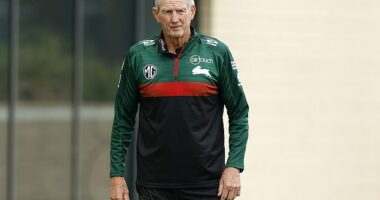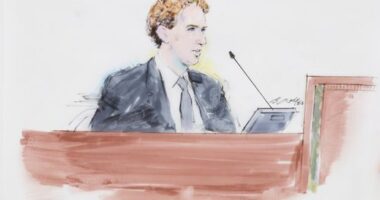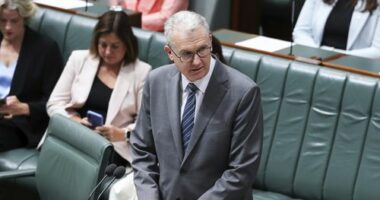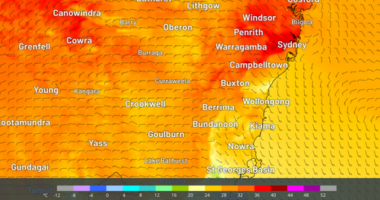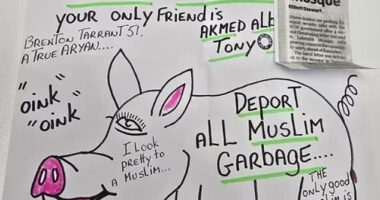Share this @internewscast.com
A mother from Queensland is advocating for the meningococcal B vaccine to be accessible to all Australian children and teenagers, after her daughter narrowly survived a severe illness.
Pamela Appleton’s daughter, Kristy, was only 17 years old when she unexpectedly became critically ill in August of the previous year.
Kristy, who was in peak physical condition as an athlete, had just returned from an impressive performance at the waterskiing world championship in Canada, securing second place in her age group.

“The very day we returned to Brisbane, our lives were turned upside down by meningococcal B,” Appleton recounted.
Attempting to adjust to the time difference by staying awake, Kristy felt fatigued. Appleton grew concerned when she heard her daughter groaning later that afternoon.
“I hurried downstairs to find Kristy unable to move, complaining of severe neck pain, so I immediately dialed triple zero,” she explained.
Kristy was taken to a local public hospital, where blood tests showed she had COVID-19.Â
Appleton said that despite her protests, Kristy was discharged from the hospital early the next morning, with doctors believing it was just COVID-19 to blame for her illness.
Back home, Kristy was still extremely sick and complaining of a sore head, neck and sensitivity to light.
Both thoroughly exhausted, Appleton and her daughter tried to rest.
“We woke up at 1am in the morning with Kristy delusional and screaming. I went in and turned the light on, and she just screamed, ‘Turn the light off’,” Appleton said.Â
“So I grabbed a mask, and I masked her, and then I rang the ambulance.Â
“They turned up immediately under sirens, and I said, ‘There is something seriously wrong.’”
At her mother’s request, Kristy was taken to a local private hospital, where, suspecting she had bacterial meningitis, the doctors sprang into action.
“The doctor said, ‘I don’t want to alarm you, but if I don’t treat this now, we’re going to lose her’,” Appleton said.Â

Kristy was put on IV antibiotics and given a lumbar puncture, which showed she had meningococcal B.
After receiving the right treatment, Kristy turned a corner and recovered, even managing to go home from hospital a week later.
More than a year on, Kristy still suffers from some fatigue, but has made a remarkable recovery.Â
Back to competing in waterskiiing, the Year 12 student was crowned world jump champion in August.
“It’s not nice, it’s really cruel.
Appleton said she had no idea there was a meningococcal B strain when Kristy got sick.


Last year, the Queensland government rolled out a free meningococcal B for young people under 20, with teens in Year 10 receiving the free shot at school alongside a federally funded vaccine for strains A, C, W and Y.
However, Kristy was a year too late to receive the free vaccine for the B strain.
“Kristy was in Year 10, in 2023, so she missed out,” Appleton said, adding she was horrified to learn that her daughter and other kids the same age were unknowingly going around unvaccinated.
In addition to Queensland, South Australia and the Northern Territory are the only other states and territories choosing to fund their own meningococcal B vaccination programs to make up the shortfall in the National Immunisation Program.
Victoria, NSW, the ACT and Tasmania are yet to do so.
Levi died last month, within 24 hours of contracting meningococcal B. Â

Levi’s devastated mother Norliah Syer-Peterson told 9news.com.au she was determined to spread the message that vaccines were needed for all Australian children and teenagers.
Appleton said she was heartbroken to hear of Levi’s death.
“I just don’t understand why it’s not part of the vaccination program for all Australians, to me, it’s just ludicrous,” she said.Â
“Why are they playing Russian roulette with children’s lives?”
In response to Levi’s death, the Royal Australian College of GPs in Victoria (RACGP) said the Victorian government needed to act.Â
“If we don’t boost vaccination rates, more lives will be at risk, including young people like Levi with their whole life ahead of them,” RACGP Victoria chair Dr Anita Muñoz said.
“By providing the meningococcal B vaccine free of charge for at-risk groups we can save lives across Victoria.Â
“Meningococcal B is a devastating disease, it kills 5â10 per cent of patients and leaves 10â20 per cent of those who survive with brain damage, hearing loss or a learning disability.”Â
“To date, the PBAC has not received an application from pharmaceutical companies seeking expanded eligibility for meningococcal B vaccine,” the spokesperson said.
There have been 13 cases of meningococcal B in Victoria so far this year.
A spokesperson for Victoria’s Health Department said: “The Chief Health Officer monitors the prevalence of meningococcal cases in Victoria, which informs their independent health advice on vaccination settings.
“The Commonwealth’s Pharmaceutical Benefits Advisory Committee does not currently recommend a meningococcal B vaccine for the broader community.”


